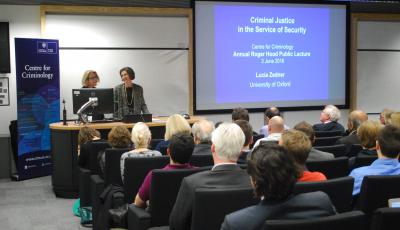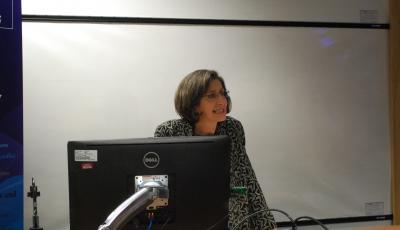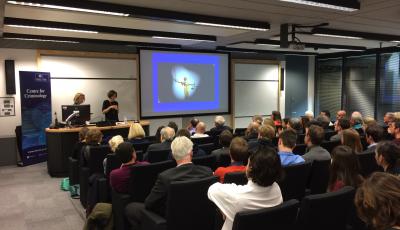On 3 June 2016, Professor Lucia Zedner delivered the Centre for Criminology’s Annual Roger Hood Public Lecture. Entitled ‘Criminal Justice in the Service of Security,’ her presentation highlighted the tensions between collective and individual security in institutions and practices of criminal justice, particularly in the contemporary context characterised by concerns about terrorism and threats to national security.

The presentation traced the emergence of key changes to criminal justice and the discipline of criminology since the 1960s. In particular, Professor Zedner argued that the role of criminal justice as a safeguard of civil liberties is under threat due to the securitisation of criminal justice in times of terror, resulting in greater secrecy and less access to open justice. Such state responses have changed the field of criminal justice, while presenting new avenues of inquiry for criminologists.

Since the 1970s, Professor Zedner argued, we’ve witnessed a move towards a more securitised form of criminal justice. While the seventies were a decade of concern about moral panics and the rise of law and order politics, the 1980s marked a greater focus on community safety and the discourse of popular punitiveness. In the 1990s, emerging concerns about actuarial justice, risk, preventive justice, and surveillance produced a plethora of security-focused criminal justice measures in the UK, including Anti-Social Behaviour Orders (ASBOs), Sexual Offences Prevention Orders (SOPOs), and Sentences of Imprisonment for Public Protection (IPPs). The shifting contours of criminal justice over the last forty years have also opened up new avenues of criminological inquiry and have required a new language to understand and make sense of the changes.
To account for the increasing securitisation of criminal justice, Professor Zedner explored key events in the UK since the 1960s that reflect the growing normalisation of collective security powers and the erosion of due process protections. She noted that the ending of the Cold War meant that the security services lost their raison d’être, which led to their involvement in high level and intelligence-led policing. However, the terror attacks of 9/11 in the United States changed everything, further undermining individual due process rights and producing criminal justice in service of a different kind of order. The attacks of 7/7 led politicians to call for a change in the rules of the game and Professor Zedner explained how criminal justice in times of terror means an erosion of individual protections through an increase in police and surveillance powers. Such trends have, she noted, an unequal impact on ethnic minorities, who are more likely to be stopped, searched, and detained through the expansion and normalisation of such powers. A similarly worrying trend is the state’s use of civil and administrative law, rather than criminal law, to side-step individuals’ due process protections and pursue collective security goals through any available legal means.
Another problematic aspect of the increasing securitisation of criminal justice is the emergence of ‘justice behind closed doors’―that is, the hiving off of more aspects of the criminal process to occur in secret. Professor Zedner gave the examples of the UK’s Special Immigration Appeals Commission (SIAC) and Terrorism Prevention and Investigation Measures (TPIMs) which rely on closed material proceedings. In particular, she explained the practice of ‘gisting’ whereby only limited information is given to defence counsel, thereby undermining their capacity to represent those subject to proceedings, while also inhibiting public accountability and denying access to researchers. Professor Zedner reviewed several key cases which have challenged this trend towards secret trials while arguing for ‘open justice’ as a fundamental aspect of the UK’s system of common law. The case of R v Incedal, in particular, involved even greater secrecy than has previously occurred in a criminal trial. However, despite such litigation, a strong deference to national security concerns remains through the continued used of closed proceedings.
In drawing her presentation to a close, Professor Zedner raised several important questions. First, how is it that criminal justice can condone the erosion of the criminal process and resort to secrecy? And second, how as researchers can we study these processes under such secretive and exclusionary conditions? Overall, the trend towards the securitisation of criminal justice leads to not so good justice, leading her to ask the vital question: What is required of criminal justice and how far can it travel before it’s no longer just? As a ‘servant of two masters’―collective and individual security―criminal justice remains an essential, if inadequate, safeguard against the arbitrary exercise of state power. Professor Zedner argued that the sacrifice of a defendant’s due process rights in the name of our security should be a cause for concern and as such, it’s important to maintain criminal justice protections for everyone as it’s in our collective interest to do so.

Against a legal and political backdrop whereby the criminalisation of acts deemed preparatory to terrorism have become increasingly wide and ambiguous, and soft forms of power through policies such as Prevent more pervasive, Professor Zedner’s engaging and timely presentation asks us to consider for whom does criminal justice provide security and at what cost? The paradox of secrecy in an age where information is increasingly fluid, accompanied by the curtailment of media scrutiny and academic analysis, was compellingly made by Professor Zedner, who ultimately argued that open justice must be defended, for justice that is not open is not good justice.
Share:
